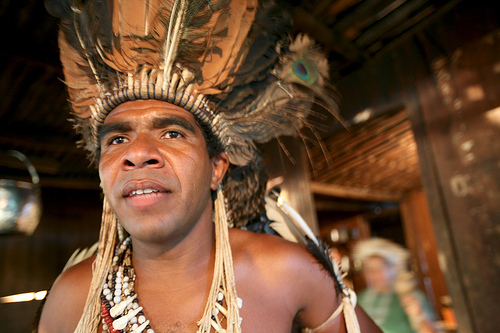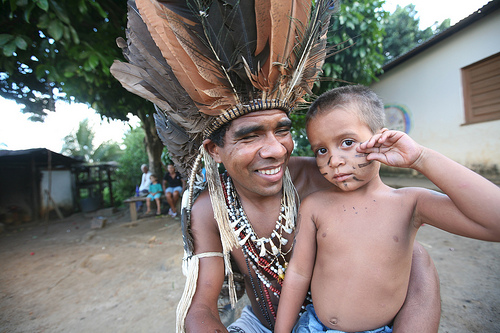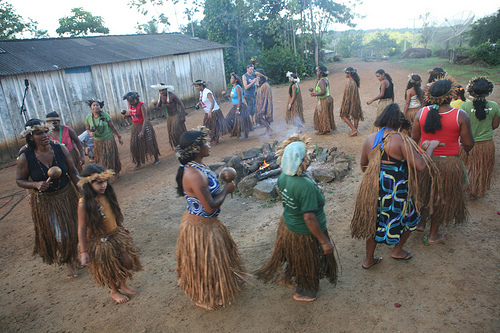There is an increasingly hostile climate in Buerarema, a town in the Brazilian state of Bahia, since on March 10th, when unidentified armed police invaded Serra do Padeiro, a Tupinambá indigenous village, and arrested their leader Rosivaldo Ferreira da Silva.
Locally known as Cacique Babau, Rosivaldo is a strong and sometimes contentious advocate of indigenous life style and self-sufficiency. A few days after his arrest and transfer to the capital Salvador, his brother Gil Ferreira was also arrested – again, as he had been allegedly tortured by Federal Police last year.
Both of them have now been transferred to the Federal Penitentiary in another state, Rio Grande do Norte, further away from their family and solicitors. Their detentions have increased the tension in the region, and Amnesty International fears that, as in the past, the Federal Police will use further excessive force.
In 2000, a year after the 500th anniversary of Brazil's “discovery” in Porto Seguro, the Tupinambá of Olivença, who live nearby, began to take direct action to reoccupy their ancestral lands. Conflict over the territory increased in April 2009, when the National Foundation of the Indian (FUNAI, a governmental protection agency for Indian interests and their culture) recognized an area of 47,000 hectares as indigenous property. The conflict continues unresolved in the courts, and as the federal government has not yet signed into law the creation of the Tupinambá demarcated indigenous land, the area remains a source of conflict and dispute.
In addition to a series of confrontations with the Federal Police, there has been also violent conflict with landowners in the past . According to reports, gunfire broke out again [pt] between the Federal Police and the Tupinambá in the end of March, during an attempt of repossession of a private farm occupied on February 19th. Anthropologist Mércio Gomes [pt] depicts the complicated background of the latest incidents:
O ex-ministro Tarso Genro assinou uma portaria de demarcação contendo cerca de 48.000 hectares de terras nos municípios ao sul de Ilhéus, incluindo fazendas e fazendolas de cacau e o complexo turístico da região. Muita confusão rola por lá, os fazendeiros não estão dispostos a abrir, os índios estão na esperança de conseguir algo e não querem negociação, e está se processando na mídia a satanização do principal líder tupinambá, Rosilvado, vulgo Babau, que está preso por acusações de invasão de propriedades e resistência a prisão.
Para resolver esse problema o governador do estado, Jaques Wagner, escalou o deputado Geraldo Simões, que tem interesse político na região para se reeleger. O referido deputado quer uma re-negociação do tamanho da proposta da Funai e a culpa por isso. Bem, se o deputado quiser ser justo nas acusações de praxe, tem que culpar o ex-ministro Tarso Genro, que acatou a proposta da Funai, mas aí são outros quinhentos.
To overcome this problem, the state Governor Jaques Wagner delegated it to local member of parliament Geraldo Simões, whose political interest in the region is to be reelected. Simões calls for a re-negotiation of FUNAI's proposed size [of the reservation] and blames FUNAI [for the confusion]. Well, if the deputy wants to be fair in his typical complaints, he has to blame former Minister Tarso Genro, who accepted FUNAI's proposal, but then it is another matter.
On the other hand
According to Indigenous and human rights advocacy groups, Rosivaldo Ferreira da Silva's arrest was illegal, and the Federal Public Prosecutor is now filing a habeas corpus on his behalf, demanding that he is either brought before a court or released. Not everyone, however, is convinced of this version. Juarez Vicente de Carvalho [pt] does not even believe Babau deserves to be called an Indigenous person and calls for his punishment:
Essas mesmas entidades ignoram e apóiam as arbitrariedades cometidas por esse “índio” e a sua gang, invadindo e destruindo as propriedades alheias sem punição e desobedecendo as determinações judiciais.
Garantida a liberdade do cacique, o Grupo Tortura Nunca Mais (GTNM) deve entrar com pedido de inclusão de Babau no Programa de Proteção aos Defensores dos Direitos Humanos. Esse grupo deveria colocar sob proteção pessoas que há mais de 30 anos vivem em suas propriedades e são atingidas e ameaçadas por esse bandido que se diz índio e sua gang. No Brasil há essa inversão de valores. Bandidos fora da cadeia. Pessoas de bem presas.
If freedom is guaranteed for the chief, the human rights organization Torture Never Again (Tortura Nunca Mais) shall apply for an application for the inclusion of Babau into the Program to Protect Human Rights Defenders. This group should protect the people who for over 30 years live in their properties and are affected and threatened by this thug, who claims to be an Indian, and his gang. In Brazil, there is this inversion of values. Bandits get out of jail. Good people are trapped inside them.
José Augusto Halla de Sá [pt] blames FUNAI and foreign social movements for the long standing conflicts, and foresees even more violence:
Esse índio arruaceiro (será que é índio mesmo?) devia mofar na cadeia, assim como os guerrilheiros do MST, Via Campesina e outros movimentos criados com o fito de pertubar a ordem pública.
A permanecer essa desordem rural, o confronto será inevitável e os campos então verdejantes serão fatalmente tingidos de sangue.
If this rural disorder continues, confrontation will be inevitable and the ever so green fields will fatally be tinged with blood.
Many more people in the south of Bahia were jubilant at the news of Babau's arrest. But according to Viola de Bolso [pt] blog, this is a sign of the population prejudice towards the native people:
Babau é a insignificância dos direitos coletivos no mundo de hoje, combatido pelas empresas do agro-negócio, pela mídia mercantil e pelos soldados de plantão, aqueles fazendeiros, falsos jornalistas, politiqueiros e suas instituições falidas.
[…] demonstra o grau de preconceito e desinformação que sofre os cidadãos comuns, distantes de sua história e de suas origens.
Enquanto isso, a cerca cresce como um lagarto imenso, a engolir territórios, devorar florestas, secar rios e reduzir futuros.
[…] it shows the degree of prejudice and misinformation that common citizens suffer, far away from their history and origins.
Meanwhile, a fence [private enterprise] is growing like a huge lizard, swallowing lands, devouring forests, drying rivers and reducing the future.
Character assassination campaigns

Cacique Babau, portraited by Sean Hawkey Serra do Padeiro in November 2009. Photo used with permission (Sean Hawkey/ACT)
Babau has been charged, amongst other crimes, with attempted homicide, threats, gross bodily harm and arson. Local human rights and indigenous groups have stated that this is part of an effort to assassinate his character and criminalise the Tupinambá of Olivença, jeopardizing their fight for their land and identity rights. Web Brasil Indígena [pt] publishes a motion of solidarity that explains how the Tupinambá of Olivença are being criminalised and “considered “invaders” of their own land”:
Assim como no passado, a atual campanha discriminatória e criminalizante em curso tem o claro objetivo de menosprezar os direitos dos Tupinambá. Incita a opinião pública contra as comunidades indígenas que lutam por seus direitos, utilizando os meios de comunicação local a serviço do poder político e econômico da região. Divulga-se uma série de mentiras e acusações contra as lideranças do povo Tupinambá de Olivença que estão mais a frente da luta.
Babau é considerado chefe de um bando, ou seja, ser liderança de uma comunidade indígena, ou quilombola é ser chefe de bando de bandidos? Se organizar em comunidade e luta por seus direitos se tornou perigoso, isto agora é considerado formação de quadrilha. Ocupar e retomar de volta suas terras, muitas delas totalmente devastadas pelo invasor, se tornou “invasão de fazendas”, e por ai vai às acusações imputadas às lideranças do Movimento Indígena, notando-se em todas elas uma total inversão de valores e uma forte carga de preconceito.
In recent months, Babau has made the headlines the national media, more often than not presented as an individual with great influence on the brewing conflict, but also an imbalanced, crazy and dangerous person. According to A Nova Democracia [pt] blog, this is no news:
A receita é a mesma: o monopólio da imprensa difama, provoca, açula as classes reacionárias e dá a senha para o massacre, perseguição e prisão de lideranças e lutadores populares.
Em 21 de novembro de 2009 a revista Época, propriedade do monopólio The Globe, publicou matéria provocadora sobre a luta dos tupinambás liderados pelo cacique Rosivaldo Ferreira da Silva, conhecido como cacique Babau, taxando-o de “Lampião tupinambá”.
Com essa denominação preconceituosa, Mariana Sanches, jornalista que assina o texto erra grosseiramente na denominação, mas acerta em cheio nas intensões do latifúndio e demais classes reacionárias: criminalizar a luta dos tupinambás pela terra.
With this prejudiced designation, journalist Mariana Sanchez, who wrote the text, makes a gross mistake by labeling him so, but hits the nail on the head in regards to the intentions of landlordism and other reactionary classes: to criminalize the Tupinambá's struggle for land.
Background
The Tupinambá were one of the various Tupi ethnic groups that natively inhabited almost all of the coast of Brazil when the Portuguese first arrived there. At the time, the Tupi people population was estimated at 1 million people, nearly the same population of Portugal back then. Like other indigenous people, in the 500 years since Europeans arrived in Brazil, the Tupinambá have experienced genocide and the loss of their land, and even of their indigenous status: the process of colonization and occupation of the South of Bahia had pulverized them as a people and denied them their own identity. This means that, in the eyes of the government, they had no right to claim an identity as indigenous tribe, and therefore the right to ancestral land, a situation that only changed in the year 2000.
In an article in Indios Online [pt], Cláudio Magalhães tells the history of his people:
Nós não tivemos descanso, são 500 anos de confronto, e sempre preservando, re-construindo.
Muito de nossos parentes não falam da história porque foram muito humilhados, hoje estão com a identidade bloqueada. Os índios daqui sempre foram muito reprimidos, perseguidos. Nos cercaram ideológicamente, sempre nos dizendo que não somos índios, que não temos direitos, que somos selvagens, brutais, que queremos que o país regrida. Mas o mundo dominante sempre nos explora, mesmo nas formas mais sutis, e Marcelino já entendia tudo isso.
Os índios de Olivença encantam por sua vontade de sobreviver. Hoje, depois de 502 anos, recebemos nosso reconhecimento oficial como índios que somos, depois de resistir a todas essas políticas de expropriação de nossas terras, sobrevivemos hoje como trabalhadores rurais em regime de escravidão, sem nenhum direito social, sem férias, sem carteira assinada, até sem documentos de identidade, trabalhando na diária a cinco reais, onde um dia de doença é descontado… Alguns índios não se assumem como índios, mas não por uma questão de covardia, e sim, de sobrevivência.
The Indians from Olivença are able to charm with their will to survive. Today, 502 years after, we have received our official recognition as the Indians. After resisting all these policies of expropriation of our lands, we survive today as enslaved rural workers, who have no social rights, no vacation, no formal contracts and who do not even have identity documents, working for five reais ($2) a day, with sick days discounted… Some Indians do not identify themselves as Indians, but this is not as a matter of cowardice, but of survival.
Also check Brazil: Suspense as indigenous land rulings in limbo, a 2008 article related to another Indigenous people from Bahia, the Pataxó Hã-Hã-Hãe. See more pictures of the Tupinambá people in the Flickr gallery of Sean Hawkey, who has kindly authorized Global Voices to use them. They were taken in November 2009 during the shooting of the video one rhythm, one world.








